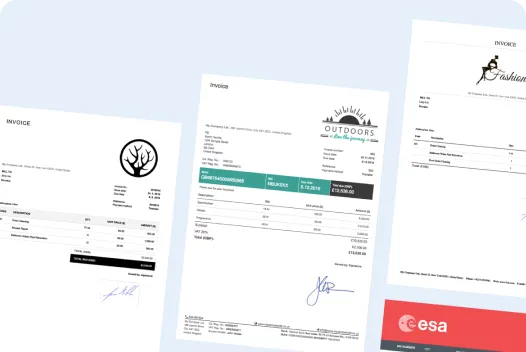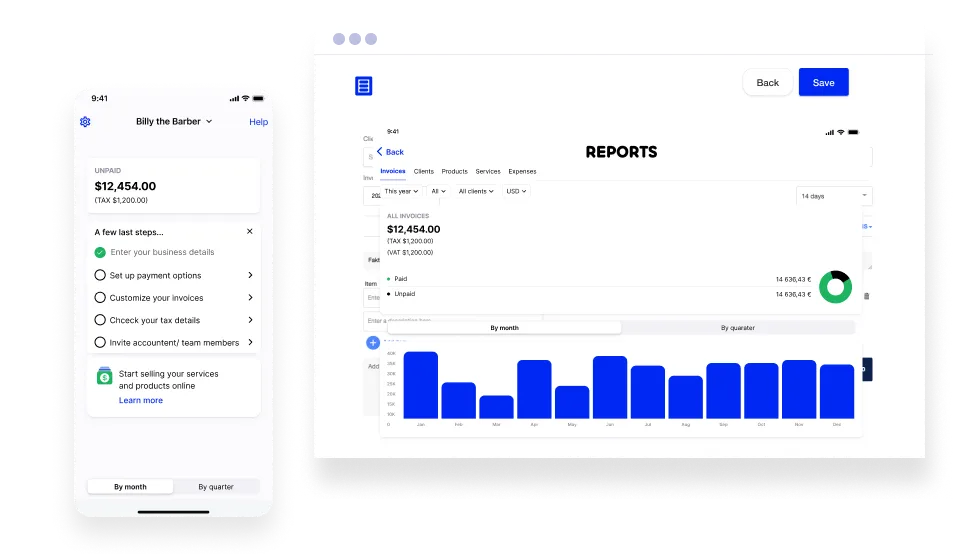Smart Invoicing Feature
Recurring payments and invoices
Set it once, get paid forever


Recurring invoices are a fundamental feature for businesses that work with clients on a regular basis. This invoicing method automates the billing process, ensuring that invoices are being issued regularly and payments are collected consistently without manual intervention.
This method helps streamline administrative tasks, reduce billing errors, and improve cash flow management.
Need a steady cash flow without the stress? Recurring payments got you covered.


Need a simple way to get paid on time, every time? Set up recurring invoices in minutes, charge clients automatically, and enjoy a steady cash flow—no more manual work!

Manually billing clients every month? It’s a waste of time.
With Billdu’s recurring payments, you get paid on time automatically. Set it up once, and let Billdu handle the rest. Need to stop? Cancel anytime, hassle-free.
Not sure if a recurring billing is right for you? Let us give you more reasons.
With the simple app, work smarter, not harder.
Get paid up to 9 days sooner.

Billdu simplifies business tracking on mobile and web.
For small businesses, Billdu keeps your business organized and accessible. For larger teams, advanced features help your business scale easily.

Grow your business with team effort. Invite all members onboard.

Get notified when exactly an invoice was opened and viewed.
Invite your accountant to the team and focus on growing your business.
Impress clients with professional invoices. Select a template and pick your business color.
Recurring invoicing refers to the process of automatically generating invoices for ongoing services or products at regular intervals, such as monthly or annually. This feature allows businesses to ensure consistent billing without manually creating an invoice each time. By utilizing recurring invoices, companies can streamline their billing process, ensuring timely payments and improved cash flow.
A recurring payment is an automatic transaction that happens at regular intervals, such as weekly, monthly, or annually. This is commonly used for subscriptions, memberships, or ongoing services like software plans and utility bills.
For example, if a client hires you for ongoing work, you can set up recurring invoices to bill them automatically every month. This ensures steady cash flow without the hassle of manual invoicing or chasing payments.
While recurring billing and recurring invoicing are often used interchangeably, they serve slightly different purposes. Recurring billing typically refers to the automatic charging of a client’s credit card or bank account for services at regular intervals. On the other hand, recurring invoicing involves sending invoices to clients for approval and payment on a scheduled basis. Both methods aim to simplify the payment process.
There are several advantages of recurring invoicing such as increased efficiency in managing cash flow, minimized administrative tasks, and improved customer satisfaction through consistent and predictable billing.
It is particularly beneficial for businesses with regular and ongoing projects as it automates the billing cycle, reduces errors, and ensures timely payment and invoice collection.
To set up recurring payments, start by choosing an invoicing platform that supports recurring billing and payment features. In Billdu, you can easily configure recurring payment settings by entering your client’s payment information, defining the billing cycle, and specifying the service or product details. Once set up, the system will handle the charges automatically, allowing you to focus on growing your business without worrying about missing a billing cycle.
You can stop a recurring payment by canceling it in your billing or invoicing system. In Billdu, simply go to your recurring invoices, select the payment you want to stop, and cancel it—no extra steps needed.
Once canceled, no further charges will be made, and your client will no longer receive automatic invoices. You can always restart or adjust the schedule if needed.

Simple Invoicing Platform for Freelancers and Small Businesses